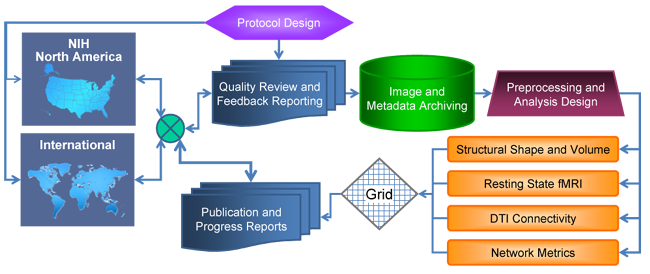With support from the National Institute of Diabetes and Digestive and Kidney Diseases (NIDDK), and as part of the Multidisciplinary Approaches to Pelvic Pain (MAPP) consortium, the UCLA Gail and Gerald Oppenheimer Family Center for Neurobiology of Stress (uclacns.org) has pioneered the development of the first large repository of well characterized multimodal brain images from patients with various persistent pain disorders (including interstitial cystitis/painful bladder syndrome, irritable bowel syndrome, vulvodynia and fibromyalgia).
The MAPP Repository was developed in close collaboration with the Laboratory of Neuro Imaging (LONI; loni.usc.edu) which has been the pioneer and world leader in building an extensive infrastructure to perform large multisite studies including an automated pipeline for acquiring, processing and analyzing imaging and patient data. The MAPP Repository has greatly benefited from the existing LONI infrastructure and expertise, both of which have been key elements of the most successful large multisite imaging initiatives including ADNI, fBIRN, ENIGMA and The Human Connectome Project (HCP). The PAIN Repository intends to continue this close interaction with LONI.
The National Institute on Drug Abuse (NIDA) and the National Center for Complementary and Alternative Medicine (NCCAM) provided a 3 year grant to the UCLA Center in September 2013 to develop and pilot test the PAIN Repository. Fifteen participating sites in North America and in Europe have agreed to participate in this groundbreaking project which aims to collect and store standardized multimodal brain images of 1,000 well phenotyped subjects including standardized clinical, behavioral and genetic metadata. Following the LONI model, the PAIN Repository will use operational protocols, quality control and analysis pipelines, large data set analytic procedures and a governance structure to support ongoing and future large multisite studies in pain. The PAIN Repository is in the process of expanding its member base further, both within the US and internationally, including data from patients with temporomandibular joint disorders, migraine, chronic pancreatitis and pediatric pain populations.
